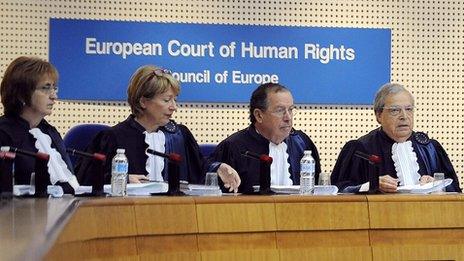Government's Abu Qatada woes increase
- Published

Theresa May's officials were blamed in the Commons for the deportation confusion
Has the latest row over the deportation of the radical Muslim cleric Abu Qatada come down to a misunderstanding about when midnight on Tuesday is?
Is it Monday night into Tuesday morning, or Tuesday night into Wednesday morning? The Home Office went for the first option, it seems, and the European Court of Human Rights the second.
This matters for two reasons: the credibility of the home secretary and how long it might take before Abu Qatada is put on a plane to Jordan - and whether he is released from prison in the meantime.
In her Commons statement, Theresa May suggested the government had a legally-watertight case to send Abu Qatada to Jordan, but it could take some months.
The home secretary, believing the deadline for an appeal to the court's Grand Chamber had passed, told MPs he could be removed from the UK "in full compliance of law".
But on Wednesday the court revealed it had received a request at 2200 BST on Tuesday evening, which it said was before the deadline.
'Delaying tactic'
Politically, it is potentially very awkward for the home secretary.
Her central pitch in the Commons was the government had secured a position of relative clarity: it could convince the European Court of Human Rights that Abu Qatada would get a fair trial in Jordan, and that evidence against him would not have been extracted by torture.
Yes, the process would take some time, but there was a clear process that had begun.
But it looks rather less clear now.
"I've been clear to everybody there were legal avenues for him to pursue," Mrs May told the BBC.
"He has employed this delaying tactic. I'm not surprised, I don't think anybody should be surprised at that and I think he did this only after he had seen the strength of the case that we have for resuming his deportation to Jordan."
But shadow justice minister Chris Bryant shot back: "What seems to have happened is that the very basic details weren't done before the big fanfare of the announcement yesterday."
'Institutionally incompetent'
The reaction from some Conservative backbenchers has followed a pattern: support for the home secretary, criticism of Home Office civil servants.
Former shadow home secretary David Davis said the Home Office had "dropped the home secretary and the ministers in it".
Tory backbencher Mark Reckless was even more blunt: "Whoever is the home secretary, the Home Office is institutionally incompetent."
"So long as civil servants are unaccountable, so long as they are promoted however wrong they get things, things will not change," Mr Reckless added.
For some days, making a broader point, the outspoken Conservative MP Douglas Carswell has been suggesting civil servants are too powerful within government.
"Concerned about Sir Humphrey? It's not just me," is the headline of his latest blog, external. He even asked David Cameron about it at Prime Minister's Questions.
Meanwhile, the questions for the Home Office and the home secretary, that perpetually poisoned chalice of cabinet posts, keep coming.
The deportation of Abu Qatada is an intensely emotive issue. Red meat for newspapers, with big political ramifications.
Even the biggest supporters of the European Court of Human Rights acknowledge that "fast track" is not in its DNA. One person's procedural niceties and due process are another's never-ending pontificating.
It can lead to a feeling for some that decisions are forever getting kicked into the legal long grass.
The political danger for the government is that the grass might just have got even longer.
- Published18 April 2012

- Published17 April 2012

- Published26 June 2014

- Published23 April 2012
